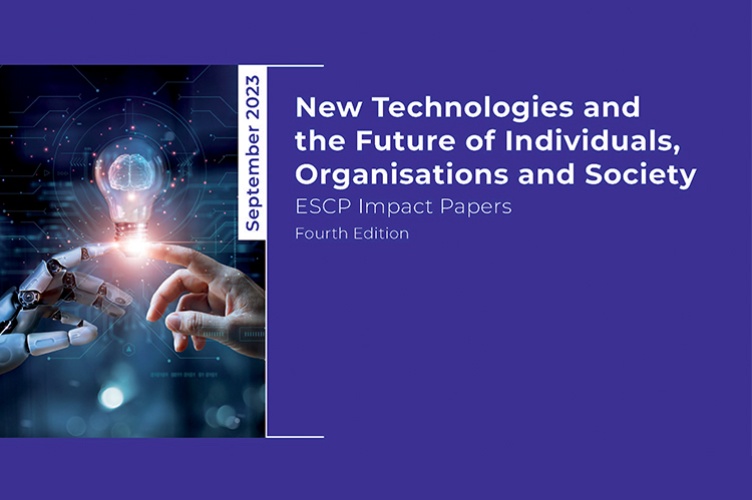Publication ESCP launches new edition of impact papers addressing how technologies are transforming our lives, both personal and professional
After the success of its first three impact papers series, ESCP Business School is proud to publish a new one: “Technologies and the Future of Individuals, Organisations and Society”.
“After three successful and impactful editions, marked by their alignment with macro-economic, social and environmental challenges, the fourth edition focuses on emergent and future technological challenges,” explain the school’s former Associate Dean for Research, newly elected Faculty Dean and Editor-in-Chief of the impact papers - Pramuan Bunkanwanicha -, the series’ Editorial Coordinator - Sonia Ben Slimane - and the new Associate Dean for Research: Professor Régis Coeurderoy. “We have been living in a rapidly changing world of technological disruptions driven by the digital revolution. Many researchers have identified tensions between benefits and challenges arising from technological innovation for organisations (on one hand) and individuals (on the other hand). At the organisational level, emerging technologies imply more opportunities to compete in fast-moving contexts, but also implementation challenges in incorporating them to their business processes.”
The underpinning idea is to investigate the following under-explored question: What will the implications of new technologies be from a holistic perspective and across the various levels of impact?
This fourth edition aims to explore all the B.E.S.T dimensions of impactful research strategy at ESCP Business School (Business, European and worldwide, Societal and environmental, and Teaching), through multi-disciplinary contributions, based on the expertise and experience of the ESCP faculty, thus stimulating creative ideas and innovative perspectives that could inspire our many stakeholders. “The underpinning idea is to investigate the following under-explored question: What will the implications of new technologies be from a holistic perspective and across the various levels of impact?” the editors add.
Unique implications and cross-sectoral impacts
“At the time of writing this Editorial and Executive Summary, we are witnessing the extraordinary properties and widespread effects of generative Artificial Intelligence (AI), notably the widely discussed ChatGPT, which illustrates how a technological innovation may impact our futures at all three levels (individual, organisational and societal). As researchers and educators ourselves, we begin to face some of the unique implications that generative AI is having for our own jobs. Our position is that these technological innovations have cross-sectoral impacts, and it is for this reason that we have put together the present Impact Papers series,” add series’ guest editors, Daniele Battaglia, Lorena Blasco-Arcas, Petros Chamakiotis, Alessandro Lanteri and Yannick Meiller, in the executive summary.
To Pramuan Bunkanwanicha, Sonia Ben Slimane and Régis Coeurderoy, ChatGPT illustrates how new technologies allow us to do things at an exponential pace and with efficient results. “However, these technologies call for a comprehensive and nuanced exploration of this transformation. It is particularly important to focus our attention on human, ethical and regulatory aspects, to avoid losing human control.” Because as Stephen Hawking once said, “success in creating AI would be the biggest event in human history. Unfortunately, it might also be the last, unless we learn how to avoid the risks...”
You can download the white paper here.
Campuses
